|
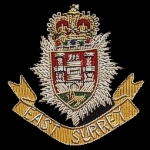
6204087
Private
George Britton
(George Jnr.)
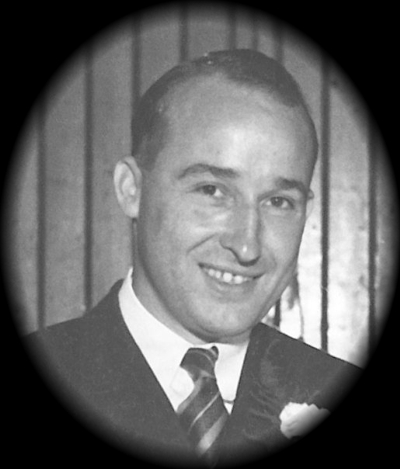
1922/11/11 - Born Seedley, Lancashire
(George gave the year of birth when enlisting as 1919 as he was 15)
Son of George Snr. and Annie Britton
(George Snr. was gassed in the trenches WWI, he died 1934)
George Jnr. left school to work at Makepeace Printers, Hampton Hill
1938/01/17 - Enlisted
East Surrey Regiment
2nd Battalion
East Surrey Regiment amalgamated with Royal Leicestershire Regiment
20th December 1941
This was due to heavy losses in both Regiments in Malaya
Then called the British Battalion
Service
Putting his age as 18 and he was enlisted in February 1938 at age 15 and 3 months old .
George was transported in 1938 to China via Gibraltar, Corfu, Port Said, Suez Canal, Aden, Colombo, Hong Kong and Shanghai. George was billeted in the Great Western Road, Shanghai in wooden barracks. Here they acted as peacekeepers between Japanese controlled Wang Ching Wei’s private police force and the local population.
Mid 1940 the regiment was sent to Malaya and billeted on the Padang in tents for 3-4 months, then to Alor Star, on the west coast, billeted in wooden huts, with training.
On 10th December 1941 the whole battalion was cut off several times with very heavy casualties at Jitra Gurun.
Due to heavy losses the East Surrey Regiment were amalgamated with Royal Leicestershire Regiment on 20th December 1941 and called the British Battalion
Following a short stay at Taipin, they proceeded to Kampar where George ran into a Japanese patrol and he was shot in both knees. Corporal Bill Riley carried George to a truck and George was taken to Alexandra Hospital, Singapore.
Several men at the Hospital, including George, were moved from an upstairs ward to the dining room and were in makeshift beds under the dining table. The Japanese rushed in, taking all the bread piled on the table. Although the orderly was marched out and bayoneted, those on the floor were ignored. They were left for three days with no food or water before being moved to Changi Camp, on anything that had wheels, no motorised vehicles being available.
1942/02/14 - Captured Singapore
Japanese PoW
Japanese Index Card - Side One
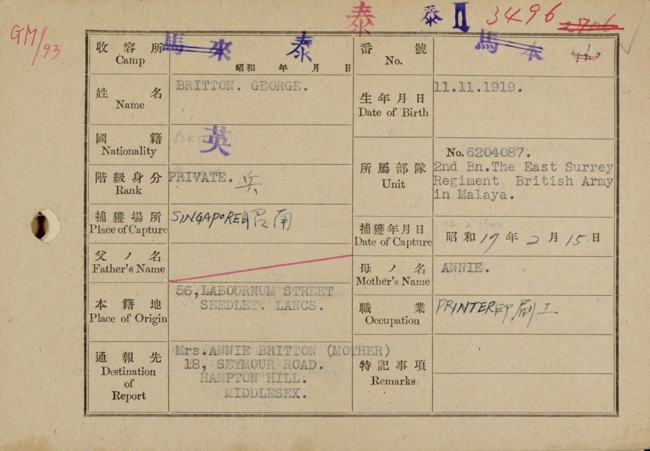
Japanese Index Card - Side Two
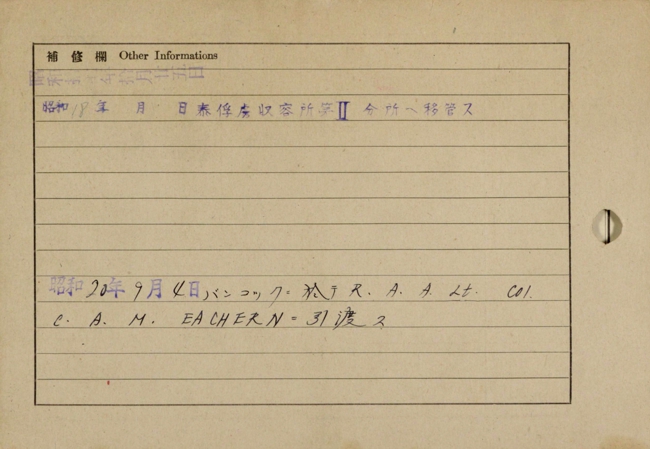
|
Date
|
Camp
|
Commander
|
|
1942/02/15
|
Changi, Singapore
|
Lt-Col. C.E. Morrison
|
|
1942/10/25
|
Transported overland to Thailand with
|
Lt-Col. C.E. Morrison
|
|
|
Letter Party ‘X’,
|
|
|
|
17th Train from Singapore, 650 PoWs
|
|
|
1942/10
|
Chungkai, Thailand
|
Lt-Col. C.E. Morrison
|
|
|
PoW No. II 2706
|
|
|
1943/02
|
Bankon, Thailand
|
Lt-Col. C.E. Morrison
|
|
1943/05
|
Tha Makhan, Thailand
|
Lt-Col. Toosey
|
|
1944/03
|
62 kilo Camp, Burma
|
Lt-Col. in Dutch Army
|
|
|
New PoW No. 3496
|
|
|
1945/03
|
Petchaburi, Thailand
|
Lt. Davidson, AIF
|
|
1945/06
|
Nakon Nayok, Thailand
|
CSM Stimpson
|
|
1945/09/04 - Liberated Thailand
Post War
1946/12/23 - Discharged
In the early days back home with his mother, brother and sisters, he was at first fastidious about washing constantly and his mother complained he wouldn’t shut any doors.
He met his future wife, Barbara, at the dance where his return ceremony was held. He became a draughtsman and as soon as he could he went to night school, passed his exams and eventually worked up to be a chartered engineer.
George returned to Singapore and Thailand in the years between 1985 and 1990. He and Barbara took the train up country to Kanchanaburi and he spent time there and at Kranji looking for the memorials to so many old friends but he said very little.
He was respectful of those who served in the wars but joined no parades.
Died
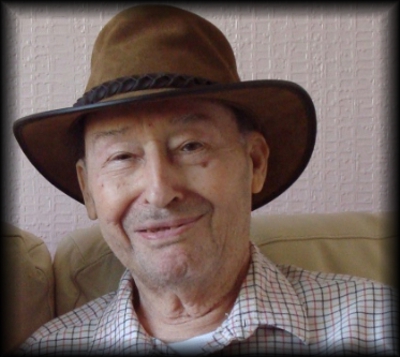
13th November 2009
Hampton Park, Middlesex
George Britton’s Funeral Tribute
Some people have a fragility about them that makes you worry about them. But others seem indestructible and it's inconceivable they won't always be there.
George was indestructible. We didn't notice him age, His hair had almost no grey, he had no wrinkles.
He was strong and capable and fixing things right up until June when he suddenly lost his strength. There didn't seem to be anything he couldn't do. Any DIY, fixing cars, turning wood, wiring, plumbing, music, sports, computers. And it's not very long since, well into his 70s he replaced the drive, by hand, using a spike and heavy hammer to break up the old concrete and lay new paving.
I want to mention a few things about his early life, partly because they must have played a part in forming his character, but he never mentioned them and I only learned them piecemeal, mostly from his sister, my Aunt Elsie.
His father's sudden death when he was a boy left the family shocked, and really quite hard up and 3 years later when he was 15 he tried to enlist. The first recruitment sergeant asked his age -17 he said. And what year were you born? 1922. Go home and grow up.
So he got his papers signed by a neighbour, Mr Mann, and tried again The second recruitment office accepted him and he was enlisted at age 15 and 3 months. His mother and sister never forgave Mr Mann. But George wrote to them and asked them not to try to get him discharged because he was earning a good wage and as a cadet he'd earn much less and be doing the same work.
It was only when we lived in Singapore and Mum and Dad came to visit that I learned a little more about his war experiences. He was in Alexandra Hospital when the Japanese overran it and bayoneted almost everyone, doctors and patients alike. He and a few other survivors were left on the floor for a few days then wheeled off to Changi, and later shipped up to work on the Death Railway. Few survived. Aunt Elsie said he'd steal food for the others from the Japanese soldiers but was caught and smashed in the face with a rifle butt, breaking his cheekbone, but he never talked about the war. The only thing I remember him mentioning was that he survived on the rice polishings that so many wouldn't touch, and those were rich in vitamins. His love and respect for food must have been influenced by the years of starvation and cooking and sharing food were always important to him.
Dinner parties with the family, John and Doreen, Alison and family.
When I think of him various cameos come to mind.
- In the early days, going downstairs in the morning singing Lindy Lou, or listening to Rigoletto, Paul Robeson and Moonlight Sonata on the tape recorder.
- Sitting on his knee and being bounced – but he'd always suddenly open his knees so I fell on the floor. - He was an unabashed tease. He told Aunt Elsie terrible tales about my mother and she believed him, for years and thought Mum a terrible woman. That amused him no end.
- Coming home from playing cricket or hockey with broken fingers but never mentioning them, just going up to bandage them up.
- Driving past a gang beating someone up, Dad leaping out with his hockey stick and chasing them off.
- Noticing he'd been overpaid and returning the amount by post, to the consternation of some office worker who couldn't understand his motivation and sent a sarcastic reply.
- Cooking or coming home with new foods. Locus beans, yoghurt, avocados, in the 60s, long before they were commonplace.
- Laughing at old black and white comedies. Laurel and Hardy, Buster Keaton, Harold Lloyd. Simple comedies. Made with wit and craft, no smut. He couldn't abide smut. Cartoons, especially Tom & Jerry, Jungle Book, football scene in Bedknobs and Broomsticks. He was very pleased that Tom (his grandson) is learning the craft of making such films in his 3d digital animation course.
- And it's interesting that although he never talked about himself or his philosophy, you can see certain of his traits and interests come down through the generations.
His love of food and cooking I think we all share (all but Rob (another grandson)), love of music and opera, Elly (granddaughter) has his love of adventure and travel and is in SE Asia right now, visiting some of those places he saw as a soldier. Ginnie (granddaughter) thought for a while she might be an architect, and this again reflects Dad's early career as a draughtsman and designer. Rob, like Dad understands how things work and can fix anything, and Rob and Tom have his natural gift with playing instruments.
He had an innovative mind and a natural morality that was all substance and not form. He never made any show, didn't join parades, paid no service to religion, shied away from any show of emotion, supported with practical help.
It was clearly evident to him some things are just right and others wrong.
His undemonstrative ways and not talking about himself had their down side. My brother and I didn't really know him, as children. He could be gruff and short tempered. We got no hugs or words of affection and it wasn't till much later that we had the maturity to appreciate his understated generosity and values.
I wish I could pick and choose the traits I inherited. I'd have the quiet heroism please, the stoicism and the capability.
Information
Beth Steiner Jones
KEW:- WO 361/2172, WO 392/23, WO 345/7, WO 361/1954, WO 361/1979, WO 361/2196, WO 361/2058, WO 361/2167, WO 361/2167, WO 361/2069,
|